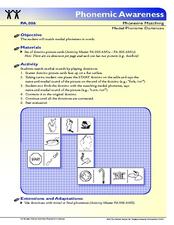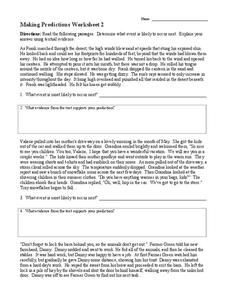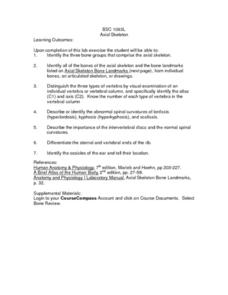Curated OER
The Greedy Dog
Teach young mathematicians the concepts of greater than, less than, and equal to with kinesthetic, visual, verbal, and numeric approaches. In a playful session that addresses multiple intelligences, your class will: dramatize a greedy...
Teach Engineering
Light Intensity Lab
Let there be light. The last installment of a seven-part series has pupils conduct an experiment on light attenuation through different numbers of transparency sheets. They then relate the results back to how X-rays measure bone density.
Curated OER
Using the 10 Times Table
Dividing by 10 and multiplying by 10 is an integral skill for young scholars as they learn base-10 multiplication and division. First, they match five products to their equivalent equations, all of which include 10 as a factor. Next,...
Spelling Words Well
Letter Lane
Dinosaur, fox, bone, mushroom. Emergent readers practice the beginning consonants sounds of b, d, f, and m with an activity that asks them to identify the images featured on a colorfully illustrated game board.
Indian Institute of Technology
Could King Kong Exist?
The title says it all: Could King Kong exist? Investigate how increasing the dimensions of an object affects its surface area and volume to mathematically conclude whether a creature with the weight and height of King Kong could actually...
Curated OER
Mathematics Activities from Diverse Cultures
Connect probability and odds with different games from around the world. Pick from games like Dreidel, Mancala, and a Navajo stick game called Ashbil. All 12 games include probability questions to encourage a discussion before or after...
Curated OER
Figurative Language Quiz
Combining questions about figurative language and Sandra Cisneros's The House on Mango Street, this quiz would be a good addition to your class. The majority contains questions about simile, metaphor, and personification, from...
Curated OER
Comprehension: Create a Summary from a Narrative Text
If your class can sequence events in a story, are pretty good at retell, and can identify the main point, they are probably ready for reading comprehension through summarizing. This lesson provides a teacher's script that facilitates...
Curated OER
From Curiosity Cabinet to Museum Collection
Students study binomial nomenclature and museum-based research. They create a curiosity box, label the objects in their curiosity box , develop a classification scheme for the objects, and create a database of all objects collected by...
Curated OER
Owls: Top of a Food Chain
Although written for middle schoolers, there is no reason that a 3rd, 4th, or 5th grader could not also learn about food chains through the dissection of owl pellets. After you introduce the topic, learners complete an owl research...
Desert Discoveries
Sonoran Desert ABC's
Third graders make alphabet cards that depict the wide variety of life forms found in the Sonoran Desert. A terrific lesson plan that combines language arts, visual arts, and life science all into one wonderful package. Each of the cards...
Curated OER
The Stuff of Stories: Using Museums to Inspire Student Writing
Middle schoolers write descriptions, narratives, and dialogues based on objects of art and time periods in a museum. They base several writing assignments on art objects and paintings, including a literal description and an emotional...
Florida Center for Reading Research
Phonological Awareness: Phoneme Matching, Medial Phoneme Dominoes
Matching medial phonemes can be as easy as playing a game of dominoes! These dominoes contain pictures of items children can say. As they say each word aloud, they work to match the medial sound to one on an adjacent card. Just like real...
BioEd Online
Muscle Fibers
What better way to learn about muscle than by dissecting one? Using cow muscle (beef), learners compare bundles of yarn to muscle fibers as they explore each. The supplemental reading about astronauts losing muscle mass in space and what...
Curated OER
Preparing for Passover
Informational texts come in all shapes and sizes. Your kids will read the New York Times article, "Preparing for Passover" then answer seven comprehension questions. The answer to each question is located in embedded hyperlinks.
Curated OER
Stem Cell Development
Like a fresh canvas, stem cells can turn into almost anything. In a comprehensive lesson, high school biologists use clay to build a 3-D model of cell division and the processes that occur during the first 14 days of development. Also...
Gottlieb
Kennings vs. Stock Epithets – A Quick Review
Bone-crusher. Troll-wife. Battle-sweat. Blood-worm. What study of Beowulf would be complete without offering readers of this Old English epic poem an opportunity to craft their own kennings and epithets? Provide individuals with a copy...
Curated OER
Women in Science: Dr. Grace Bush
Learn about the study of paleoecology with a resource about Dr. Grace Bush and her contributions to the field. After reading a one-page passage, learners answer comprehension questions and explore their personal interests in different...
Curated OER
Endocrine System - Hormones
Use this attractive PowerPoint to introduce all the hormones and their functions to your students. As students view each slide, they should be able to see the relevance of many of the chemicals and their interaction with the human body....
American Museum of Natural History
Super Teeth
A brief comparison of human teeth versus animal teeth sets the stage for two worksheets. Scholars match a picture of a tooth-filled mouth to the animal to which it belongs and coloring pages featuring a different animal and informative...
E Reading Worksheets
Making Predictions #2
What happens next? Learn to make predictions with five short passages. As kids finish reading each passage, they jot down what they think will happen next, as well as the evidence from the text that supports their prediction.
Print and Practice
Recognize the Numbers 1-10
In this numbers 1-10 worksheet, students circle all the designated numbers that appear within a set of numbers, then trace each number and color a set of dog bones beside each number. Students complete the same activities for numbers...
Curated OER
Axial Skeleton and Fetal Skull
In this science worksheet, learners identify bone groups from a given list. Students list each bone included in the axial skeleton. Learners answer questions about specific bones, their location and importance.
Curated OER
Dissecting Owl Pellets
Students examine owl pellets and what their diet consisted of, specifically rodents. This furthers their understanding of simple food chains as well as bone structure and identification.























